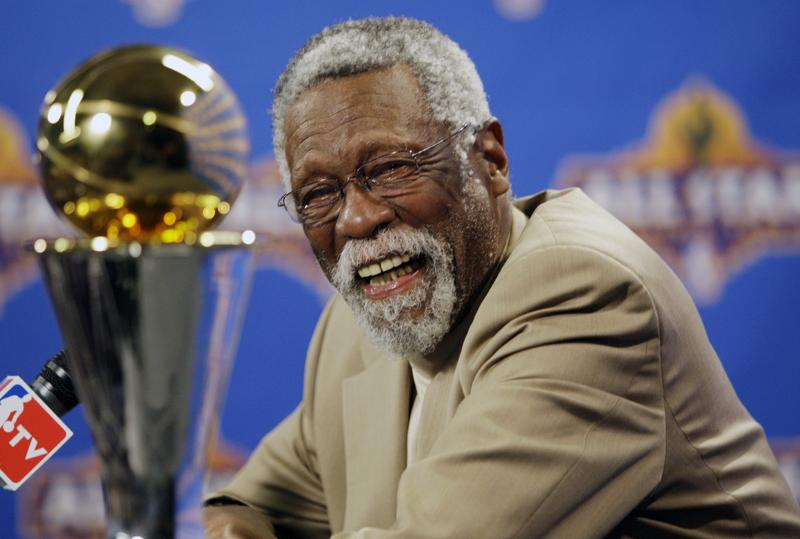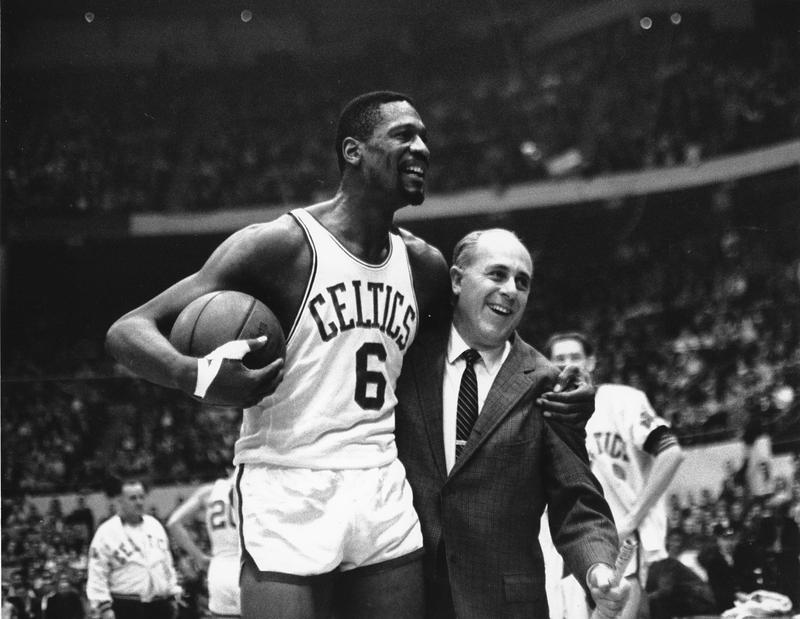 NBA great Bill Russell reacts at a news conference as he learns the most valuable player award for the NBA basketball championships has been renamed the Bill Russell NBA Finals Most Valuable Player Award, Feb 14, 2009, in Phoenix. (MATT YORK / FILE / AP)
NBA great Bill Russell reacts at a news conference as he learns the most valuable player award for the NBA basketball championships has been renamed the Bill Russell NBA Finals Most Valuable Player Award, Feb 14, 2009, in Phoenix. (MATT YORK / FILE / AP)
Former Boston Celtics star Bill Russell, one of the sports world's greatest winners as the anchor of a team that won 11 NBA championships, as well as the league's first black coach, died on Sunday at the age of 88.
Russell, a five-time Most Valuable Player who was also outspoken on racial issues, passed away peacefully with his wife Jeannine by his side, according to a statement posted on his Twitter account that did not state a cause of death.
"Bill Russell was the greatest champion in all of team sports," NBA Commissioner Adam Silver said in a statement.
"The countless accolades that he earned for his storied career with the Boston Celtics – including a record 11 championships and five MVP awards – only begin to tell the story of Bill's immense impact on our league and broader society."
Russell averaged 15.1 points and 22.5 rebounds per game for his career. He was the NBA's most valuable player in 1958, 1961, 1962, 1963 and 1965 and was a 12-time All-Star
Russell became a superstar in the 1950s and 1960s not with flashy scoring plays but through dominating rebounding and intense defensive play that reshaped the game. He also had what team mate Tom Heinsohn called "a neurotic need to win".
The Celtics won 11 NBA titles in Russell's 13 years with the team from 1956 through 1969. He was the player-coach on two of those championship teams.
"To be the greatest champion in your sport, to revolutionize the way the game is played, and to be a societal leader all at once seems unthinkable, but that is who Bill Russell was," the Celtics said in a statement.
"Bill Russell's DNA is woven through every element of the Celtics organization, from the relentless pursuit of excellence, to the celebration of team rewards over individual glory, to a commitment to social justice and civil rights off the court.
"Our thoughts are with his family as we mourn his passing and celebrate his enormous legacy in basketball, Boston, and beyond."
Defensive genius
The Russell-era Celtics teams were rich in talent. Heinsohn, Bob Cousy, Frank Ramsey, Bill Sharman, Tom "Satch" Sanders, John Havlicek, Don Nelson, Sam Jones and K.C. Jones, his old college team mate, would all join him in the Basketball Hall of Fame, as would their coach, Red Auerbach.
But Russell's rebounding and defense, especially his shot-blocking, were unprecedented and set him apart. Russell, who was spindly compared to opponents at the center position when he came into the NBA, would leap to block opponents' shots at a time when the prevailing defensive philosophy was that players generally should not leave their feet.
"Russell defended the way Picasso painted, the way Hemingway wrote," Aram Goudsouzian said in his book King of the Court: Bill Russell and the Basketball Revolution.
"In time, he changed how people understood the craft. Until Russell, the game stayed close to the floor. No longer."
Russell averaged 15.1 points and 22.5 rebounds per game for his career. He was the NBA's most valuable player in 1958, 1961, 1962, 1963 and 1965 and was a 12-time All-Star.
Despite the individual honors, Russell viewed "team" as a sacred concept.
"For me, it didn't make any difference who did what as long as we got it done," Russell said.
READ MORE: Suns signal NBA title ambitions with new Ayton deal
Civil rights activist
Off the court, Russell was opinionated and complicated. He had a baleful glare but also a delightful cackling laugh. He was intellectual and a "Star Trek" fan. Often surly or indifferent to fans and hostile toward the media, he could be exceedingly gracious with team mates and opponents. He refused to sign autographs, saying he preferred to have conversations.
Russell often criticized Boston, a city with a history of racial strife, and was one of the sports world's leading civil rights activists in the 1950s and 1960s. He was on the front row in Washington in 1963 when Doctor Martin Luther King delivered his "I Have a Dream" speech.
"Bill stood for something much bigger than sports: the values of equality, respect and inclusion that he stamped into the DNA of our league," said Silver.
"At the height of his athletic career, Bill advocated vigorously for civil rights and social justice, a legacy he passed down to generations of NBA players who followed in his footsteps.
"Through the taunts, threats and unthinkable adversity, Bill rose above it all and remained true to his belief that everyone deserves to be treated with dignity."
 Bill Russell (left), star of the Boston Celtics, is congratulated by coach Arnold "Red" Auerbach after scoring his 10,000th point in the NBA game against the Baltimore Bullets in Boston Garden on Dec 12, 1964. (BILL CHAPLIS / FILE / AP)
Bill Russell (left), star of the Boston Celtics, is congratulated by coach Arnold "Red" Auerbach after scoring his 10,000th point in the NBA game against the Baltimore Bullets in Boston Garden on Dec 12, 1964. (BILL CHAPLIS / FILE / AP)
Celebrated rivalry
Russell had a celebrated rivalry with another NBA superstar, Wilt Chamberlain, who played for the San Francisco/Philadelphia Warriors, Philadelphia 76ers and Los Angeles Lakers. Chamberlain was an athletic freak the likes of which had not been seen in the NBA - muscular, exceptionally agile, 2.16 meters tall and the most prodigious scorer of his time.
Chamberlain and Russell, who was 7.6 to 10 cm shorter, went head to head against each other in some epic battles. Chamberlain almost always outscored him but Russell's Celtics had an 86-57 record against Chamberlain's teams. Chamberlain compiled the record-breaking personal statistics but Russell ended up with more championship rings than fingers.
In 1965, Chamberlain became the first NBA player to earn a $100,000 annual salary so Russell demanded - and got - a contract from the Celtics that paid him $100,001. Yet the fierce rivals were friends off the court, often dining at each other's homes.
Russell was born Feb 12, 1934, in West Monroe, Louisiana, and was eight when his family moved to Oakland, California, seeking more economic opportunity and an escape from the extreme racial segregation of the US South.
It was in Oakland that Russell's career as a winner began. His high school team won two state championships and he led the University of San Francisco to national titles in 1955 and 1956. Russell also was captain of the US team that easily won the gold medal at the 1956 Olympics in Melbourne.
ALSO READ: Curry's 43 points lead Warriors to tie 2-2 in NBA finals
Medal of freedom
When the Celtics retired his No 6, Russell's love of privacy and belief in the team concept led him to demand a private ceremony with coaches and team mates in an otherwise empty arena. He declined to attend the 1972 ceremony at which his number was retired in front of fans and also skipped his induction ceremony at the Basketball Hall of Fame.
Russell returned to basketball as general manager and coach of the Seattle SuperSonics from 1973 through 1977 and as coach of the Sacramento Kings for part of the 1987-88 season.
Russell became semi-reclusive after his coaching career, saying, "I wanted to be forgotten." He took tentative steps back into the public arena beginning in the early 1990s, after becoming a founding board member of MENTOR: the National Mentoring Partnership. He said his mentoring effort was the "proudest accomplishment in life."
Russell went on to make frequent public speaking appearances and television commercials and even showed up when the Celtics dedicated a statue of him in Boston's City Hall Plaza in 2013.
In 2011, President Barack Obama cited Russell's dedication to mentoring when he awarded him the Presidential Medal of Freedom, which Russell called the second greatest personal honor of his life. The first, he said, was when his 77-year-old father told him that he was proud of him.
Russell, who lived in Mercer Island, Washington, was married three times and had three children.


